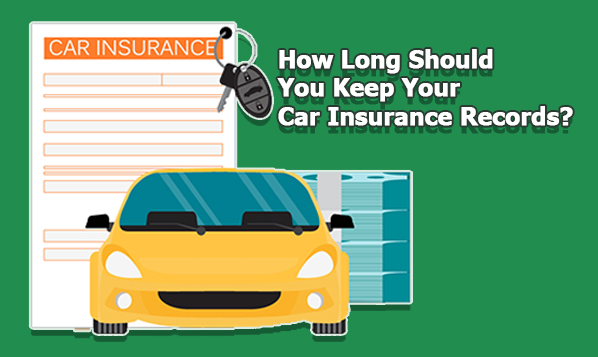Maintaining a record of your financial records is both essential and a great personal practice. Keep personal and financial documents, including car insurance, in a convenient location, both digital and physical, for easy access in case of authorities’ inquiries. However, you might be curious about how long you should keep your car insurance records.

The duration you should keep your car insurance records varies depending on the kind of document. Generally, you should hold onto the documentation of your insurance policy until it has expired and all claims (if any) have been resolved. This article provides comprehensive guidance on maintaining insurance documents, safe disposal methods, and the appropriate storage distance for insurance records.
Car Insurance Records That You Need to Keep
Until your car insurance coverage expires, it is advisable to save your auto insurance statements and associated paperwork. These documents could consist of:
- Your insurance ID card
- Declaration page
- Documents relating to a claim
- Your monthly billing statement
Your insurance ID card
This document serves as insurance documentation. In many places, it must be given when a police officer requests it or when you are in an accident. Ensure to keep this card in your wallet, glove box, center console, or as an easily accessible digital file on your smartphone while the policy is in effect.
Declaration page
Visit the insurance declarations website to quickly understand your policy’s coverage types, limits, and potential exclusions. Keep this document in a secure, easily accessible location until the policy period ends and any outstanding claims are settled. This may include a desk drawer or filing cabinet.
Documents relating to a claim
Photographs from an accident and repair receipts are important records to preserve. Also, possessing these can help guarantee that your auto insurance company handles your claim correctly. Generally, these records should only be disposed of following the processing of your claim and the receipt of your payment.
Your monthly billing statement
Until the insurance period has expired or your payment has been processed, it can be wise to retain monthly statements. Consult your tax expert first if your insurance applies to a business since they could advise preserving statements for a few years. Furthermore, statements should be stored in a secure location, such as a drawer or locked filing cabinet.
Car Insurance Records That You Do Not Need To Keep
Knowing what you cannot keep and when is also important when deciding how long to keep old car insurance policies and other records. However, you are not required to hold onto the following records:
- Your main policy documents
- Canceled checks for paid premiums
- Previous ID cards
Your main policy documents
The policy document, which includes policy limits, discounts, coverage, and endorsements, is often kept until the policy is renewed. It is advisable to hold onto it until the policy package comes if the insurer does not offer digital access. The documentation can be safely disposed of once the policy has expired and payment has been received.
Canceled checks from paid premiums
Canceled checks are no longer returned by many banks. If yours does, after you have reconciled the checks with your account, you can trash them.
Previous ID cards
The only meaningful insurance ID card is the one that shows your current coverage period, which is usually six months or a year. Moreover, discarding old ID cards and replacing them with new ones, emphasizes the importance of recycling.
Why Do I Need a Copy of My Car Insurance
An auto insurance policy is a contract between you and your insurance provider. The insurance provider covers you from the policy’s inception until its expiry, in exchange for your premium payments. Additionally, your policy will specify what is covered, what is excluded, and what the insurance company is liable for.
The provisions of your policy will be cited by the insurance company when you file a claim. For this reason, it’s critical to understand your policy’s coverage and keep a copy handy so you can examine its benefits before filing a claim. You can appeal by citing a specific policy clause if the insurance company rejects your claim.
What’s the Best Way to Keep Insurance Records
To ensure a backup, it is recommended to maintain both physical and digital copies of your insurance records. Hard copies should be stored in a climate-controlled environment to prevent mold growth, fading, and other potential issues. To keep moisture out and save documents in the event of a fire, think about getting a waterproof case or fire safe. Furthermore, consider both drive-based and cloud-based storage options for digital paper storage to protect against potential breaches.

